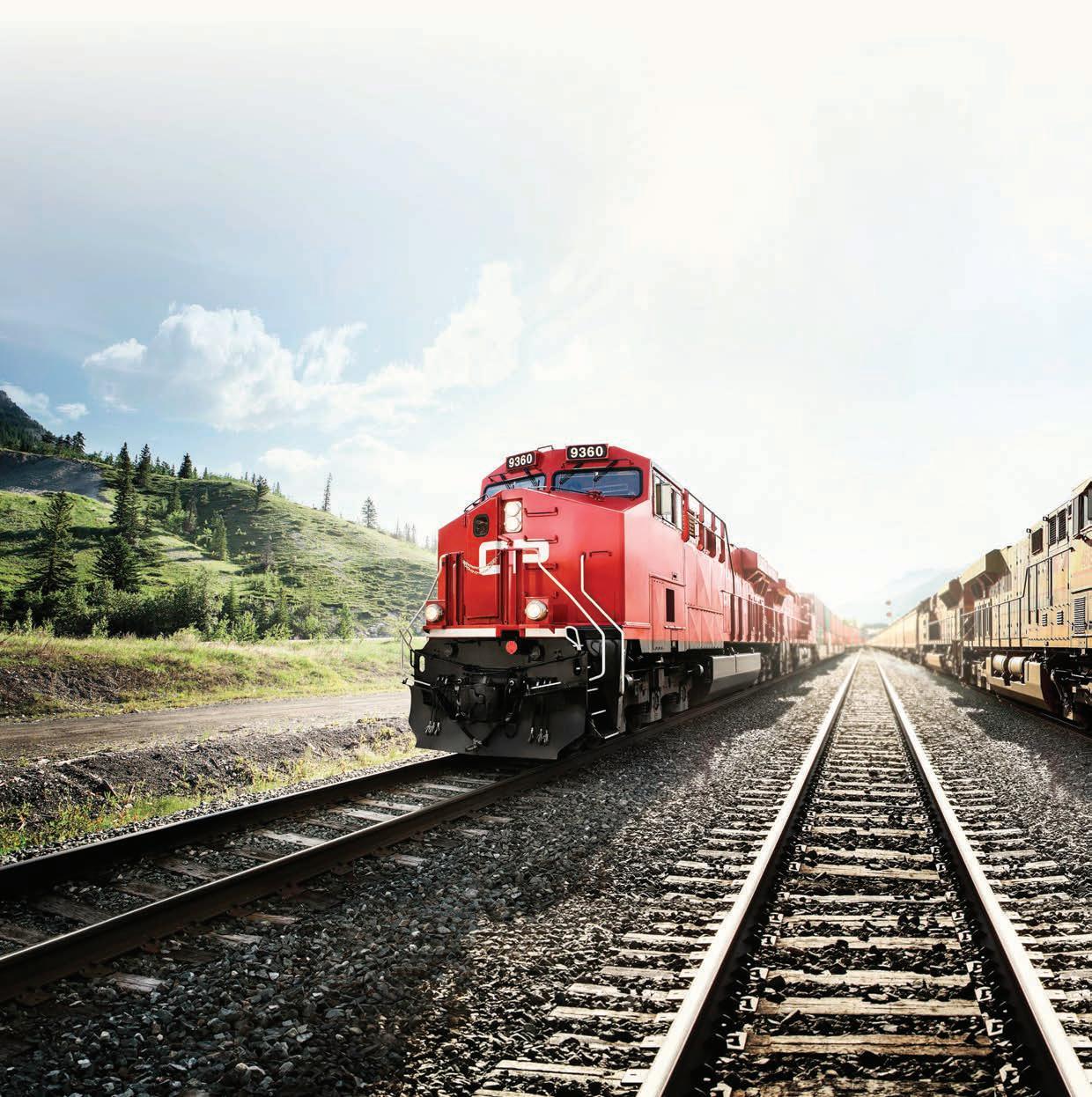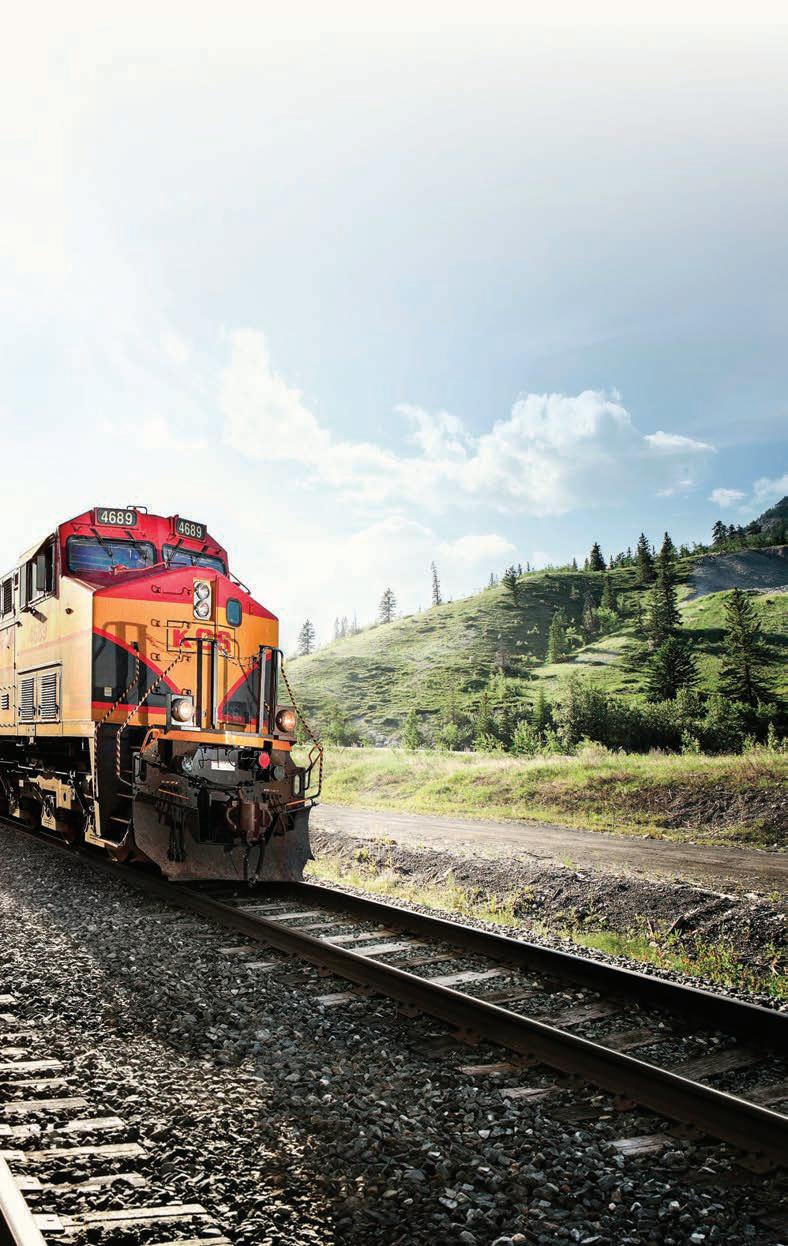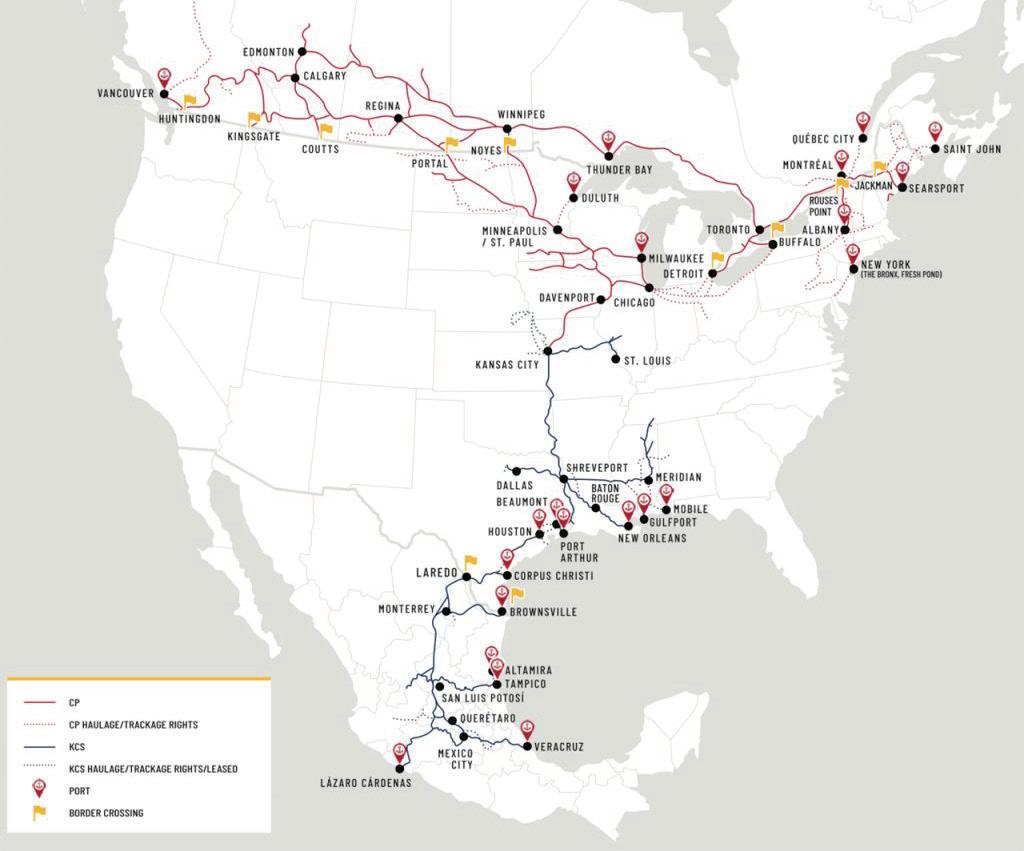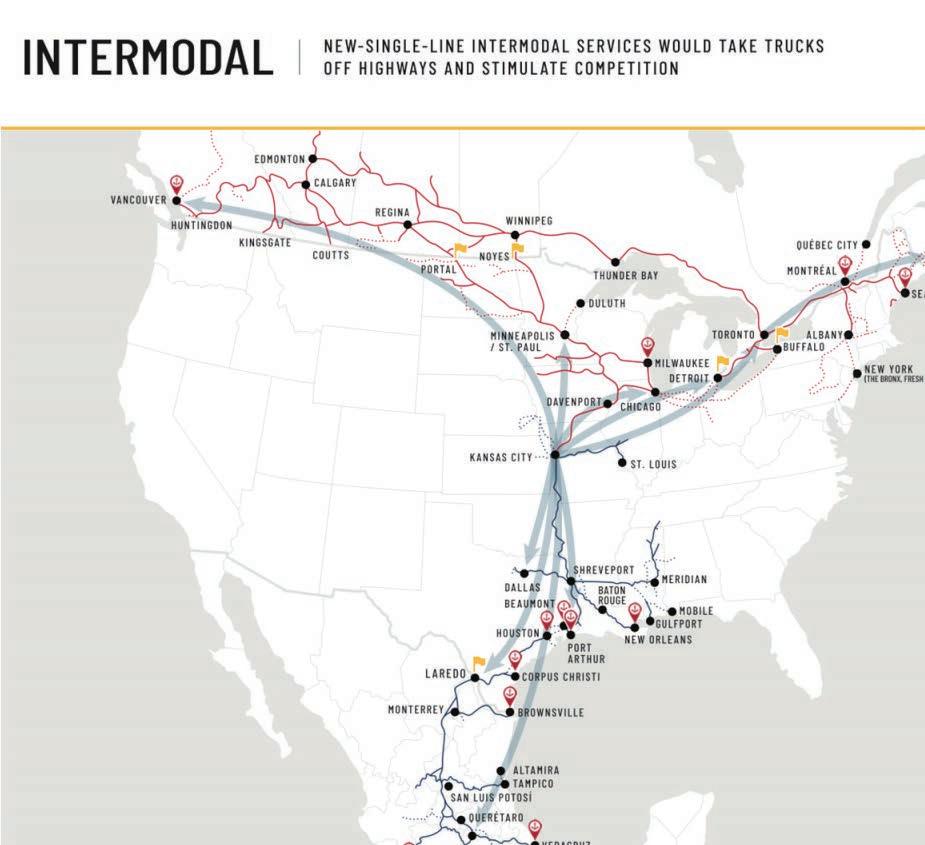
9 minute read
Going Transnational
The early March 21, 2021 announcement by Canadian Pacific Railway and Kansas City Southern that the two Class I railroads intend to tie the knot in an end-to-end, north-south transnational merger touching Canada, the United States and Mexico came as a complete surprise to most rail industry stakeholders and observers. If approved by the Surface Transportation Board— and at present there is no reason to believe otherwise—the US$29 billion combination of CP and KCS into CPKC (“Canadian Pacific Kansas City”) will be the first merger of its type since the Conrail split of the late 1990s.
CPKC: The name doesn’t roll that easily off the tongue (actually, it’s something of a tongue-twister), but if the benefits of this merger to shippers and the North American economy come to pass as strongly as the partners are promoting, the freight will be rolling on the rails a whole lot better. That will have a lot to do with USMCA (United States-Mexico-Canada Agreement), which replaced NAFTA in mid-2020. KCS President and CEO Pat Ottensmeyer earned Railway Age’s 2020 Railroader of the Year Award largely for his efforts on USMCA. His two predecessors at KCS, Mike Haverty and Dave Starling, were presented the award in 2001 and 2012, respectively, for creating and growing KCS de México. Our 2021 Railroader of the Year, CP President and CEO

Canadian Pacific and Kansas City Southern join forces to create the “USMCA Railroad.”
BY WILLIAM C. VANTUONO, EDITOR-IN-CHIEF
Keith Creel, has taken to the next level the growth and performance that his mentor, the late Hunter Harrison, 2015 Railroader of the Year, brought to CP. (Harrison was so-honored in 2002 for his work at CN/ Illinois Central, but that’s another story). Harrison died before his vision of a transcontinental railroad could be realized. Creel and Ottensmeyer have embarked on creating the first-ever “USMCA Railroad,” a transnational spanning North America. Starling is trustee of the voting trust CP is establishing to acquire KCS shares.
Five Railroaders of the Year who are part of this initiative: Coincidence? No way. Call it serendipity.
CP and KCS described the US$29 billion as “enterprise value” that includes the assumption of $3.8 billion of outstanding KCS debt. The transaction, which has the unanimous support of both boards of directors, values KCS at $275 per share, representing a 23% premium, based on the CP and KCS closing prices on March 19, 2021 (and $270 per share, representing a 26% premium, based on the respective CP and KCS 30-day volume weighted average prices, VWAP).
THE PROCESS Upon shareholder approval of the transaction, and satisfaction of customary closing conditions, CP will acquire KCS shares and place them into the voting trust. This step is currently expected to be completed in second-half 2021. Following the closing into a voting trust, common shareholders of KCS will receive 0.489 of a CP share and $90 in cash for each KCS common share held. KCS common shareholders are expected to own 25% of CP’s outstanding common shares, “providing the ability to participate in the upside of both companies’ growth opportunities,” the railroads said in their announcement. “Following final STB approval, KCS shareholders will additionally participate in the realization of synergies resulting from the combination.”
To fund the merger’s stock consideration, CP will issue 44.5 million new shares. The cash portion will be funded through a combination of cash-on-hand and raising approximately $8.6 billion in debt, for which financing has been committed. As part of the merger, CP will assume approximately $3.8 billion of KCS’ outstanding debt. Following the closing into trust, CP expects that its outstanding debt will be approximately $20.2 billion.
CP and KCS said the combination “is expected to be accretive to CP’s adjusted diluted EPS in the first full year following CP’s acquisition of control of KCS, and is expected to generate double-digit accretion upon the full realization of synergies thereafter.”
“Joining seamlessly in Kansas City, Mo., in America’s heartland, CP and KCS together will connect customers via single-network transportation offerings between points on CP’s system throughout Canada, the U.S. Midwest, and the U.S. Northeast and points on KCS’ system throughout Mexico and the South Central U.S.,” CP and KCS said. “The combined network’s new single-line offerings will deliver dramatically expanded market reach for customers served by CP and KCS, provide new competitive transportation service options, and support North American economic growth. The transaction
From the West, CP connects directly with KCS. From the East, CP must operate over Norfolk Southern through central Michigan via limited trackage rights into Chicago, then over CP short line subsidiary DM&E-South.

is also expected to create jobs across the combined network. Additionally, efficiency and service improvements are expected to achieve meaningful environmental benefits.
“While remaining the smallest of six U.S. Class I railroads by revenue, the combined company will be a much larger and more competitive network, operating approximately 20,000 miles of rail, employing close to 20,000 people and generating total revenues of approximately $8.7 billion, based on 2020 actual revenues.
“The combination will provide an enhanced competitive alternative to existing rail service providers and is expected to result in improved service to customers of all sizes. Grain, automotive, auto parts, energy, intermodal and other shippers will benefit from the increased efficiency and simplicity of the combined network, which is expected to spur greater rail-to-rail competition and support customers in growing their rail volumes. A single integrated rail system will connect premier ports on the U.S. Gulf, Atlantic and Pacific coasts with key overseas markets. The combination of CP and KCS networks will offer unprecedented reach via new single-line hauls across the combined company’s continent-wide network. Importantly, no customer will experience a reduction in independent railroad choices as a result of the transaction. Additionally, with both companies’ focus on safety and track records of operational excellence, customers will benefit from a seamless integration of the two systems without service disruption. “CP and KCS interchange and operate an existing shared facility in Kansas City, Mo., which is the one point where they connect. This transaction will alleviate the need for a time-consuming and expensive interchange, improving efficiency and reducing transit times and costs. The combination also will allow some traffic between KCS-served points and the Upper Midwest and Western Canada to bypass Chicago via the CP route through Iowa. This will improve service and has the potential to contribute to the reduction of rail traffic, fuel burn, and emissions in Chicago, an important hub city.”
Following STB approval, CP will acquire control of KCS. Creel, whose contract has been extended to 2026, will serve as the CEO of the combined company. Calgary will be the global headquarters of CPKC, and Kansas City, Mo., will be designated as the U.S. headquarters. The Mexico headquarters will remain in Mexico City and Monterrey. CP’s current U.S. headquarters in Minneapolis-St. Paul “will remain an important base
of operations.” Four KCS Directors will join CP’s expanded Board.
“The timing is ideal,” Creel told Railway Age. “You’ve got two companies that have been stars in the industry from a growth perspective. Two like-minded CEOs, committed to customer service. The opportunity to put these two networks together checks all those boxes. It allows reach to be extended, service to be enhanced, seamless single-line moves, and creates compelling value that’s unparalleled for customers. It drives job growth, positive for both companies, investment in those communities. Plus something that’s very important: environmental benefits, to be able to create something with a compelling opportunity to take trucks off the road, which uniquely benefits the environment.”
“There are many aligned stars,” Ottensmeyer said. “USMCA. Near-shoring. De-risking the supply chain. The uniqueness that this network combined creates, the ability to drive investment, safety and efficiency is unparalleled. You have the two smallest railroads that, as strong as we are, when you put them together, what that unlocks isn’t possible, standalone. It’s extremely compelling in today’s world. Truly, no people suffer. It’s about growth and value creation. There is not a single customer or market where you have a 3-to-2 or 2-to-1. In fact, if you look at the new network that we’re creating here, Mexico and Texas to upper Great Lakes, Chicago Detroit, we are creating a 2-to-3 situation. It fits nicely with the STB’s mindset of enhancing competition, creating a new competitive option that doesn’t exist, a new option for truck to rail conversion.”
Shippers appear to be largely in favor. The majority of those that participated in a Cowen and Company survey on the proposed merger have a positive view of the transaction, and merger synergies “look promising,” according to the firm. These shippers (44%) were joined by respondents who said they have “no opinion” of the merger (38%); only 18% said they had a negative view. “This is encouraging,” said Cowen and Company Managing Director and Railway Age Wall Street Contributing Editor Jason Seidl. While it’s still early in the process, 50% of those with a negative opinion said they do not plan to take action with the STB, while 3% do and 47% have not yet decided, according to the survey.
CP and KCS said late last month that they have received statements and letters, all filed with the STB, from nearly 260 shippers, other railroads, economic development authorities, ports and other supporters for their planned combination. Notable is that Genesee & Wyoming, the largest Class II and III railroad holding company, has filed in support of the deal. “Many of these supporters requested the STB to review the transaction as swiftly as possible,” the merger partners said. “They expect the combination would, among other benefits, invigorate transportation competition, expand access to existing and growing markets, and provide new service offerings that would improve transit times and reliability.”
“The combination should create customer growth in North America, efficiencies in new single-line routes, increased market reach, and notable synergies,” Seidl said. “Leveraging its network, the combination will allow for KCS traffic to bypass Chicago via CP’s route in Iowa, reducing congestion, fuel burn and emissions. We are confident in management’s ability to execute. Keith Creel studied under Hunter Harrison, and CP is a well-respected operator. KCS’ management team will remain on through the end of the merger. We have upmost respect for KCS management, as they have been successfully implementing PSR and posting good results while navigating through the difficulties of 2020. In aggregate, we see a low level of risk associated with the deal. The STB updated its merger regulations in 2001, but gave KCS an exemption. Unless the STB reverses its prior ruling, we would expect it to ultimately support the combination.”
Residual effects? “CPKC will likely have impacts across the supply chain,” Seidl noted. “We don’t believe this deal will cause the final round of rail mergers in the industry necessarily, for two reasons. The first is that any other mergers will likely be met with far greater scrutiny from the STB, as KCS is the only railroad with an exemption from the 2001 rulings. The second reason stems from the fact that this merger is largely a north/south play and does not create a U.S. transcontinental operation. Hence, the acquisition of Norfolk Southern or CSX by another railroad would not likely be a necessary response.”
“Hunter would be proud,” Keith Creel reflected. “He was about value creation, customer solutions, simplicity, taking out hauls. This is positive for assets, efficiency and service. You reward your shareholders and your customers. He is elated now.”





